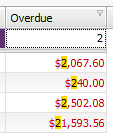You are viewing an old version of this page. View the current version.
Compare with Current View Page History
« Previous Version 9 Next »
https://help.myob.com/wiki/x/twjW
How satisfied are you with our online help?*
Just these help pages, not phone support or the product itself
Why did you give this rating?
Anything else you want to tell us about the help?
While the search feature is great for finding cards that match simple criteria, filtering enables you to take searching to the next level.
For example, you might want to filter your cards list to show all customers who:
- have an outstanding balance greater than a certain value
- you promised to get back to on a certain date
- haven't bought from you this year
- live in a certain state or postcode.
Simple filter
To filter your cards, click the Filter button. A blank row will appear at the top of your card list.
Type into a column's filter row to only show cards that have matching values in that column.
By default, typing a filter term will only show results that begin with the characters you enter. If you want to show all fields that contain the filter term, not just start with it, add an asterisk at the beginning.
For example:
If you type 2 into the Overdue column's filter row, only balances that start with 2 will appear.
| If you type *2, all overdue balances that contain 2 anywhere in the balance will display.
| Or, you can select the specific entry you're looking for by clicking the icon in the column header.
|
- When filtering a currency column:
- you don't need to enter commas or the currency sign.
- you can use these characters to filter the amounts:
- < (less than)
- <= (less than or equal to)
- > (greater than)
- >= (greater than or equal to)
- - (between).
For example, type 1000-2000 to find all amounts between $1,000 and $2,000. Or type >1000 to find amounts greater than $1,000.
- When filtering dates, you can enter the exact date you're looking for, or use the * character to search for a year (eg *2016) or click the filter icon in the date column's header. You can then select a date from a calendar, or choose from one of the smart options below the calendar, like "Today" or "Tomorrow".
You can also use these characters to filter the dates:- < (less than)
- <= (less than or equal to)
- > (greater than)
- >= (greater than or equal to)
- - (between).
For example, type <=30/9/2016 to find all dates up to and including 30 September 2016.
- What’s filtered: The list will only filter the records that are currently showing in the window. If you've done a search by entering a term in the Search field, and then use the filter row, the list will display only those records that match both the search term and the filter term.
- Only exact phrases are supported: The AND, OR and NOT options that are available in the main Search field can't be used when filtering in the filter row. The filter assumes, and only handles, exact phrases (but you don't need to use quotation marks to indicate it).
Filters are not saved: Any filtering you apply is cleared when you close the Cards List window.
If you want to reuse a filter later, open the Customise Filters window (see below), click the Text tab and copy the filter configuration into a notepad text file or Word document. Later you can paste that filter settings straight into the Text tab of the Customise Filters window and apply it in just a couple of clicks.
Need even more filtering power? Then give the Customise Filter a go.

You can access it by either clicking a filter icon in a column header and choosing Custom, right-clicking a column header and choosing Filter Editor, or by clicking the Edit button at the bottom of the list if a filter has already been applied.


The filter allows you to create or edit multiple conditions in one go.
For example, below we've set up two conditions. In this case, the Cards List window will only show customers with overdue balances greater than $1,000.

Advanced filter options
A filter has several parts you can define:
| Filter option | How to use |
|---|---|
| Filter type | You can choose to only show cards that match all conditions you set (select AND), or all cards that match at least one of the conditions (select OR). Click the red “And” or “Or” link to choose your filter type.
|
| Column | Which column do you want to filter? Click the text that’s within the square brackets to choose from the columns that have been added to the Cards List window.
|
| Operator | Choose the appropriate operator for the condition. For example, greater than, equal to, doesn’t contain, or begins with, etc.
For date columns, there are lots of filtering options you can choose from, like "Is tomorrow" or "Is later this month". Note that if you choose "Is earlier this year" or "Is later this year" this refers to the period prior to, or after, the current month. |
| Value | What's the value you are looking for, or comparing to? What you enter depends on the column type. For example, this could be a number, like shown below, letters, or a date. |







 Yes
Yes
 No
No
 Thanks for your feedback.
Thanks for your feedback.